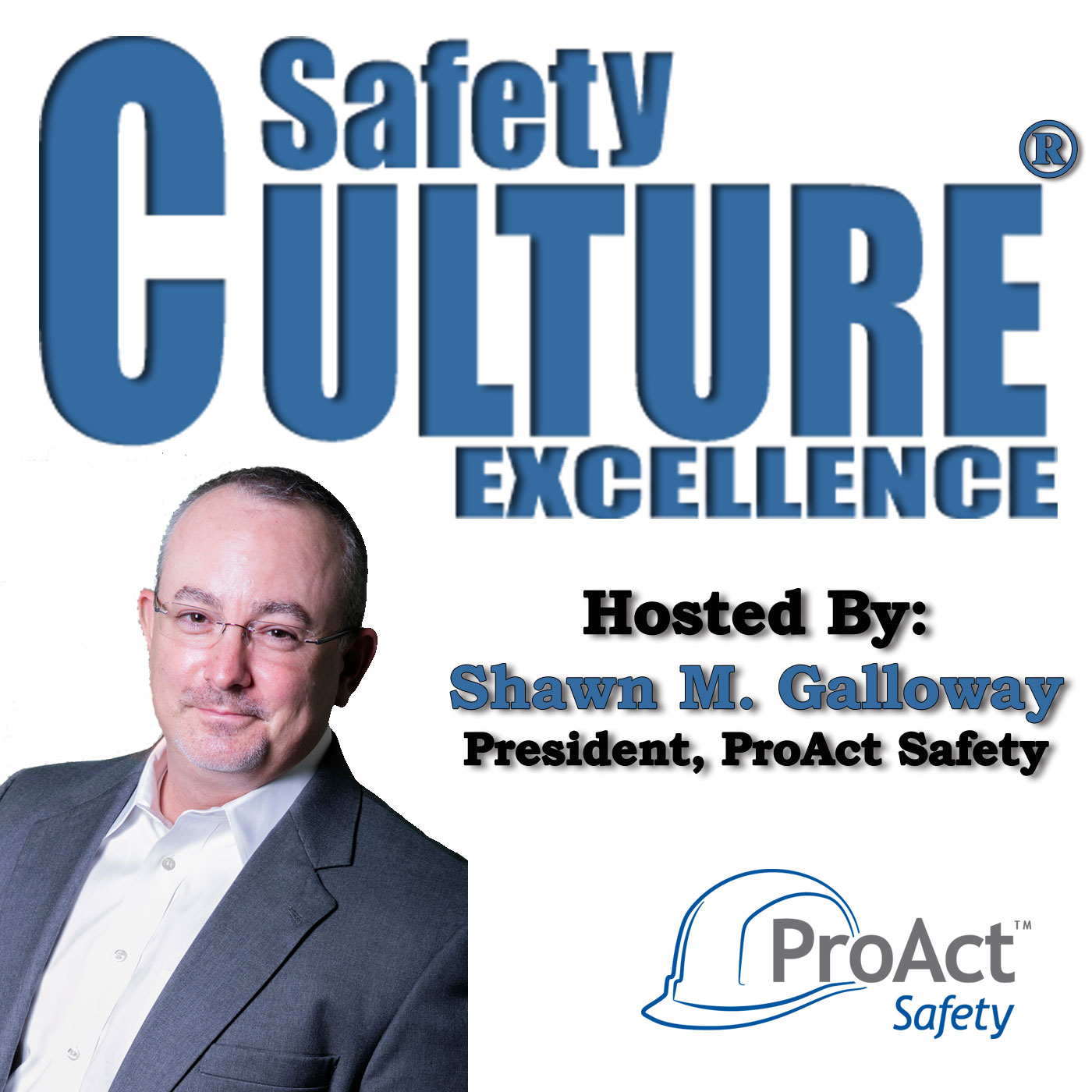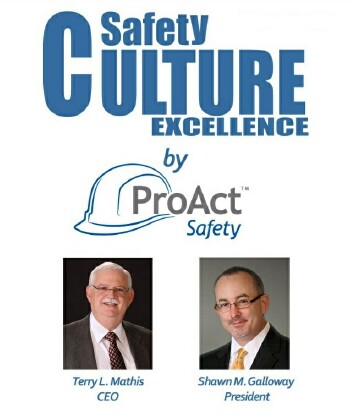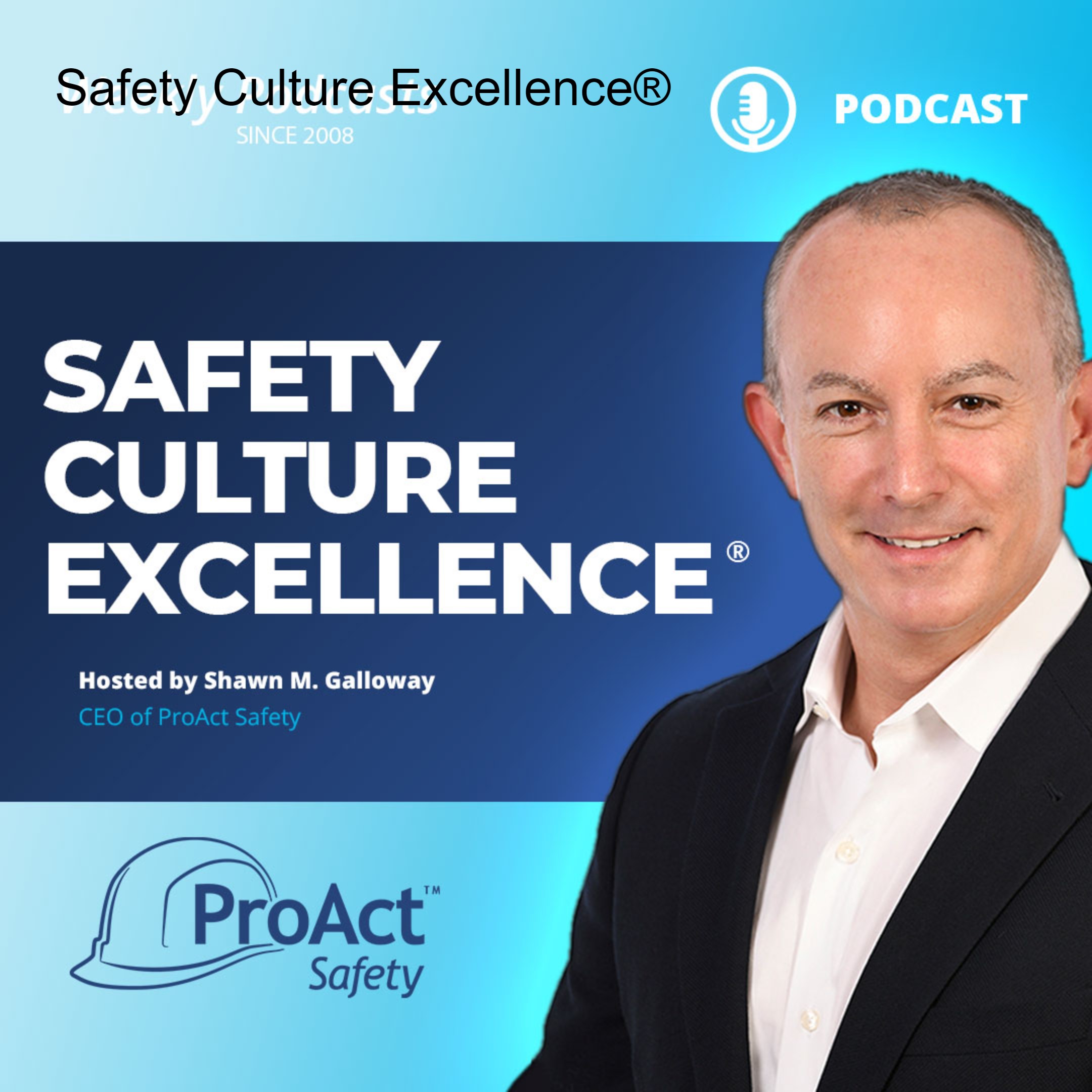Episodes

Monday Nov 14, 2016
465: Changing Safety Terminology
Monday Nov 14, 2016
Monday Nov 14, 2016
Hello, welcome to this week’s podcast, brought to you by ProAct Safety, the leader in the world of safety excellence. For more information on this topic, or how we help lead individuals and organizations towards excellence in performance and culture, please visit us at www.ProActSafety.com
I hope you enjoy the podcast this week. If you would like access to archived podcasts dating back to January 2008, please visit the store section at ProActSafety.com. For additional insights (articles, blogs, books, speaking locations, webinars and videos) visit www.ProActSafety.com/Insights
Have a great week!
Shawn M. Galloway
ProAct Safety


Monday Oct 24, 2016
462: Are Safety and Productivity Enemies
Monday Oct 24, 2016
Monday Oct 24, 2016
Hello, welcome to this week’s podcast, brought to you by ProAct Safety, the leader in the world of safety excellence. For more information on this topic, or how we help lead individuals and organizations towards excellence in performance and culture, please visit us at www.ProActSafety.com
I hope you enjoy the podcast this week. If you would like access to archived podcasts dating back to January 2008, please visit the store section at ProActSafety.com. For additional insights (articles, blogs, books, speaking locations, webinars and videos) visit www.ProActSafety.com/Insights
Have a great week!
Shawn M. Galloway
ProAct Safety


Monday Sep 12, 2016
456: Safety Culture So Much Controversy
Monday Sep 12, 2016
Monday Sep 12, 2016
Hello, welcome to this week’s podcast, brought to you by ProAct Safety, the leader in the world of safety excellence. For more information on this topic, or how we help lead individuals and organizations towards excellence in performance and culture, please visit us at www.ProActSafety.com
I hope you enjoy the podcast this week. If you would like access to archived podcasts dating back to January 2008, please visit the store section at ProActSafety.com. For additional insights (articles, blogs, books, speaking locations, webinars and videos) visit www.ProActSafety.com/Insights
Have a great week!
Shawn M. Galloway
ProAct Safety


Monday Sep 05, 2016
455: From Do As You Are Told to a Desire To Do More
Monday Sep 05, 2016
Monday Sep 05, 2016
ello, welcome to this week’s podcast, brought to you by ProAct Safety, the leader in the world of safety excellence. For more information on this topic, or how we help lead individuals and organizations towards excellence in performance and culture, please visit us at www.ProActSafety.com
I hope you enjoy the podcast this week. If you would like access to archived podcasts dating back to January 2008, please visit the store section at ProActSafety.com. For additional insights (articles, blogs, books,speaking locations, webinars and videos) visit www.ProActSafety.com/Insights
Have a great week!
Shawn M. Galloway
ProAct Safety


Monday Aug 29, 2016
454: Controlling the Climate of Safety Culture
Monday Aug 29, 2016
Monday Aug 29, 2016
Hello, welcome to this week’s podcast, brought to you by ProAct Safety, the leader in the world of safety excellence. For more information on this topic, or how we help lead individuals and organizations towards excellence in performance and culture, please visit us at www.ProActSafety.com
I hope you enjoy the podcast this week. If you would like access to archived podcasts dating back to January 2008, please visit the store section at ProActSafety.com. For more detailed strategies to achieve and sustain excellence in performance and culture, pick up a copy of our book, STEPS to Safety Culture Excellence - http://proactsafety.com/insights/steps-to-safety-culture-excellence
Have a great week!
Shawn M. Galloway
ProAct Safety


Monday Aug 08, 2016
451: Guard the Front Door - Protecting Your Safety Culture
Monday Aug 08, 2016
Monday Aug 08, 2016
Hello, welcome to this week’s podcast, brought to you by ProAct Safety, the leader in the world of safety excellence. For more information on this topic, or how we help lead individuals and organizations towards excellence in performance and culture, please visit us at www.ProActSafety.com
I hope you enjoy the podcast this week. If you would like access to archived podcasts dating back to January 2008, please visit the store section at ProActSafety.com. For more detailed strategies to achieve and sustain excellence in performance and culture, pick up a copy of our book, STEPS to Safety Culture Excellence - http://proactsafety.com/insights/steps-to-safety-culture-excellence
Have a great week!
Shawn M. Galloway
ProAct Safety


Monday Jul 25, 2016
449: Contractor Safety Management Aligning Strategy and Culture
Monday Jul 25, 2016
Monday Jul 25, 2016
Hello, welcome to this week’s podcast, brought to you by ProAct Safety, the leader in the world of safety excellence. For more information on this topic, or how we help lead individuals and organizations towards excellence in performance and culture, please visit us at www.ProActSafety.com
I hope you enjoy the podcast this week. If you would like access to archived podcasts dating back to January 2008, please visit the store section at ProActSafety.com. For more detailed strategies to achieve and sustain excellence in performance and culture, pick up a copy of our book, STEPS to Safety Culture Excellence - http://proactsafety.com/insights/steps-to-safety-culture-excellence
Have a great week!
Shawn M. Galloway
ProAct Safety


Monday May 23, 2016
441: Strategy and Culture, Not Either-Or
Monday May 23, 2016
Monday May 23, 2016
Hello, welcome to this week’s podcast, brought to you by ProAct Safety, the leader in the world of safety excellence. For more information on this topic, or how we help lead individuals and organizations towards excellence in performance and culture, please visit us at www.ProActSafety.com
I hope you enjoy the podcast this week. If you would like access to archived podcasts dating back to January 2008, please visit the store section at ProActSafety.com. For more detailed strategies to achieve and sustain excellence in performance and culture, pick up a copy of our book, STEPS to Safety Culture Excellence - http://proactsafety.com/insights/steps-to-safety-culture-excellence
Have a great week!
Shawn M. Galloway
ProAct Safety


Monday May 16, 2016
440: Five Reasons You Have Undesired Performance
Monday May 16, 2016
Monday May 16, 2016
Hello, welcome to this week’s podcast, brought to you by ProAct Safety, the leader in the world of safety excellence. For more information on this topic, or how we help lead individuals and organizations towards excellence in performance and culture, please visit us at www.ProActSafety.com
I hope you enjoy the podcast this week. If you would like access to archived podcasts dating back to January 2008, please visit the store section at ProActSafety.com. For more detailed strategies to achieve and sustain excellence in performance and culture, pick up a copy of our book, STEPS to Safety Culture Excellence - http://proactsafety.com/insights/steps-to-safety-culture-excellence
Have a great week!
Shawn M. Galloway
ProAct Safety


Monday Jan 18, 2016
423: Climate and Culture Before Not After Behavior-Based Safety
Monday Jan 18, 2016
Monday Jan 18, 2016
Hello, welcome to this week’s podcast, brought to you by ProAct Safety, the leader in the world of safety excellence. For more information on this topic, or how we help lead individuals and organizations towards excellence in performance and culture, please visit us at www.ProActSafety.com
I hope you enjoy the podcast this week. If you would like access to archived podcasts dating back to January 2008, please visit the store section at ProActSafety.com. For more detailed strategies to achieve and sustain excellence in performance and culture, pick up a copy of our book, STEPS to Safety Culture Excellence - http://proactsafety.com/insights/steps-to-safety-culture-excellence
Have a great week!
Shawn M. Galloway
ProAct Safety

Version: 20241125

